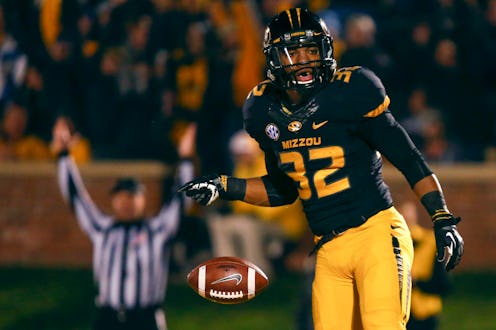News
Mizzou Students Protest Racism On Campus
A group of Mizzou students calling themselves Concerned Student 1950 blocked a car during the Homecoming parade. One student is nearly a week into a hunger strike. More than 30 University of Missouri football players are protesting and refusing to play. What is going on at the University of Missouri? After a series of racist events occurred — including the use of racial slurs toward the student body president and other black students, as well as the drawing of a swastika with human feces in a dormitory — students are calling for the removal of University of Missouri System president Tim Wolfe, claiming he hasn't done enough in addressing systemic racism.
Wolfe oversees the network of Missouri campuses, including the main one in Columbia and several others in St. Louis, Kansas City, and Rolla. On Friday, he released an apologetic statement acknowledging racism at the University of Missouri and saying he has met with several student groups and values their input.
Racism does exist at our university and it is unacceptable. It is a long-standing, systemic problem which daily affects our family of students, faculty and staff. I am sorry this is the case. I truly want all members of our university community to feel included, valued and safe.
But for the students, it's not enough — they want Wolfe gone. Jonathan Butler, a graduate student studying educational leadership and policy analysis, began a hunger strike on Nov. 2, stating in a letter to the system board of curators (which has the power to fire Wolfe) that he would continue until "Tim Wolfe is removed from office or my internal organs fail and my life is lost." According to the Columbia Missourian, Butler's letter referenced not only the racist incidents on campus, but also other controversial events that have happened at the university this fall, including the removal of graduate students' health care subsidies and the cancellation of Planned Parenthood contracts, which many saw as appeasing to political pressure. Butler wrote:
In each of these scenarios, Mr. Wolfe had ample opportunity to create policies and reform that could shift the culture of Mizzou in a positive direction but in each scenario he failed to do so.
Wolfe said he is concerned for Butler's health and encouraged him to seek a "different method of advocating for this cause." He, and University of Missouri Chancellor R. Bowen Loftin, who has also been criticized for his handling of campus events, have both released statements saying they remain open to meeting with concerned students.
Although Butler's hunger strike and the protests of hundreds of students through the Concerned Student 1950 group did gain attention in the community, it wasn't until Mizzou football players said they would boycott any football participation that the story gained national attention. The athletes' announcement came shortly after Wolfe was videotaped telling a group of black student protestors that systematic oppression happens "because you don’t believe that you have the equal opportunity for success."
Like Butler, in a statement, the football players said they won't participate in any football related activities until Wolfe resigns or is removed "due to his negligence toward marginalized students' experiences." And they have the support of their coaches and the athletic department, too. Mizzou Athletics tweeted, "We all must come together with leaders from across our campus to tackle these challenging issues and we support our student-athletes right to do so." Head football coach Gary Pinkel tweeted, "The Mizzou Family stands as one. We are united. We are behind our players." Even Missouri Gov. Jay Nixon has spoken out, writing in a statement:
Racism and intolerance have no place at the University of Missouri or anywhere in our state. Our colleges and universities must be havens of trust and understanding. These concerns must be addressed to ensure the University of Missouri is a place where all students can pursue their dreams in an environment of respect, tolerance and inclusion
Black students weren't admitted to the University of Missouri until 1950. For context, Harvard admitted a black student in 1847, more than 100 years earlier; the University of Michigan admitted a black medical student in 1853; and somewhat nearby Iowa State graduated a black law student in 1879. Missouri, like many midwest and southern colleges, was well behind the curve.
Activism and protests at the university have picked up in recent years, especially after the 2014 death of Michael Brown in Ferguson, Missouri, just two hours away. And this year, when student body president Payton Head was called racial and homophobic slurs, he spoke up, describing in a powerful Facebook post the pain that marginalized groups — black students, LGBT students, female students, international students — can feel when subjected to hate.
It's been a fall of turmoil at the University of Missouri this year, and as of now it doesn't seem like Wolfe is close to willingly stepping down. But with a starving student, hundreds of protestors, and now members of the football team calling for his removal, something will likely change — and fast.
